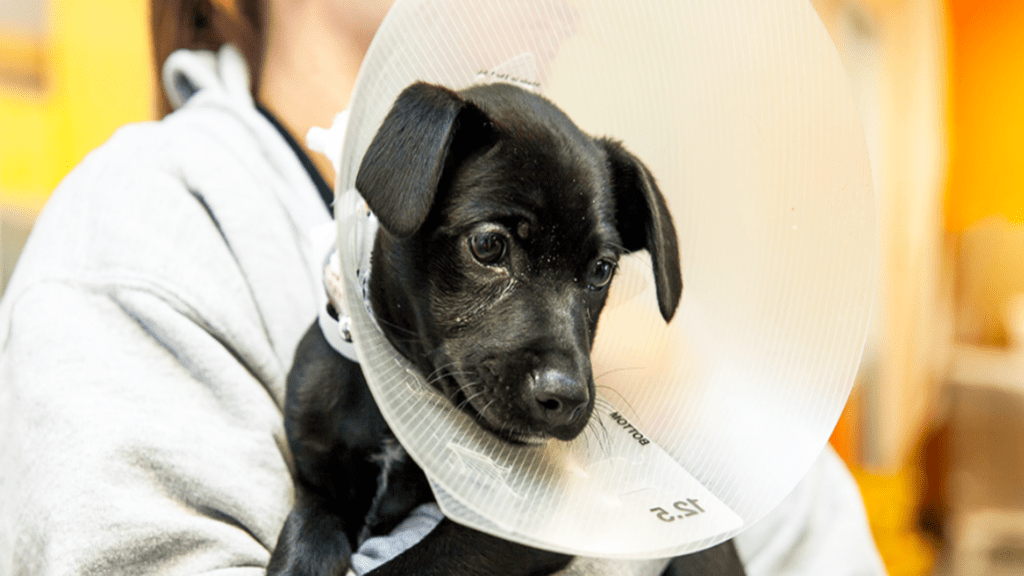Pros and Cons Of dog Flu Vaccine – Canine Influenza
There are some pros and cons of a dog flu vaccine. While no human vaccine is available yet, your dog can get a vaccine to help protect them from the flu. But is it worth getting your dog the vaccine? Let’s examine the pros and cons of vaccinating your pet against canine influenza.
With dog flu on the rise, many pet owners wonder if they should vaccinate their pets. While the vaccine can be beneficial, there are also a few downsides to consider before making a decision. This post will inspect the pros and cons of vaccinating your dog against canine influenza.
This simple procedure can prevent thousands of unwanted animals from being born yearly. It is also advantageous for your dog’s health. Please visit your veterinarian today to learn more about spaying or neutering your pet. Thank you for considering this important issue!
Pets are a big responsibility. They need food, water, exercise, and love. Spraying or neutering helps to control the pet population and has health benefits for your pet. So if you haven’t already done so, spay or neuter your pet today!
THE DOG FLU VACCINE, COSTS, SIDE EFFECTS & NECESSITY
This simple procedure can prevent thousands of unwanted animals from being born yearly. Please visit your veterinarian today to learn more about spaying or neutering your pet. Thank you for considering this important issue!
Pets are a big responsibility. They need food, water, exercise, and love. As we already know, Spraying or neutering helps to control the pet population and has health benefits for your pet. So if you haven’t already done so, spay or neuter your pet today!
When Was Dog Flu Antidote Originated?
Dogs can get the flu, and there’s a vaccine to prevent it. It’s something you may not have known until recently, but now that you do, it’s essential to ensure your canine companion is up-to-date on their vaccinations. This new vaccine is good news for dog owners, as it could help keep our furry friends healthy and safe from the dangers of the flu. So if you haven’t already gotten your dog vaccinated against the flu, be sure to do so soon.
Is your dog one of the lucky ones who never get sick? Well, maybe you should consider getting them a flu vaccine. It turns out that there is now a vaccine available for dogs against the H3N1 flu virus. Of course, you’ll still need to monitor their health and ensure they’re getting enough exercise, but at least this gives you one less thing to worry about. So if you haven’t done so already, talk to your veterinarian about vaccinating your dog today. Who knows – it might just save their life!

THE DOG FLU VACCINE EFFECTIVE
Are you wondering if the dog flu vaccine is effective? Here are some things to consider.
Are you considering whether or not to have your pet vaccinated for the dog flu? You’ve come to the right place. This post will examine the vaccine’s effectiveness and help you decide if it’s the right choice for your pet. Stay safe and healthy, everyone!
While the dog flu vaccine is not 100% effective, it can help reduce your pet’s risk of becoming ill. If you are concerned about your pet’s health, talk to your veterinarian about vaccinating them against the dog.
ARE THERE SIDE-EFFECTS
This includes regular vet checkups, vaccinations, and spaying or neutering. But are there any risks associated with these procedures? Are there side effects that pet owners should be aware of? Here’s what you need to know.
For years, spaying or neutering your pets has been considered the responsible thing to do. But are there any side effects to this standard procedure? So if you’re considering getting your pet spayed or neutered, rest assured that the benefits outweigh any potential risks.
IS IT NECESSARY FOR YOUR DOG?
While there are some definite pros to spaying or neutering your pet, it’s not always an easy decision. In this post, we’ll look closer at both spaying and neutering and what benefits they offer pets and their owners. Read on for more information on this important topic!
Dogs are a loyal and beloved part of many families, but owning a dog involves a lot of responsibility. Many people wonder if it’s essential, but here are three reasons why it is.
Dogs are amazing creatures. They provide us with companionship, love, and loyalty—and they always seem happy to see us. However, dogs also have some definite needs, chief among them being proper nutrition, plenty of exercise, and regular vet checkups. But is spaying or neutering your pet one of those needs?
This blog post will explore the pros and cons of spaying or neutering your dog and help you decide what’s best for your furry friend. Spoiler alert: most experts agree that fixing or neutering is good for most pets!

ARE THERE SIDE EFFECTS FOR DOGS
It’s no secret that dogs are adorable. They’re also loyal, and friendly and make great companions. But you may not know that there are some potential side effects to having a dog in your life. This post will look at the most common side effects of owning a dog. Keep reading to learn more!
Do you know what the side effects of owning a dog are? No, I’m not talking about the occasional mess they might make on your floor. I’m talking about all the other things that come with dog ownership – like barking at every noise, taking up half of your bed, and needing to go for walks even when it’s cold and rainy. If you’re thin about getting a dog, it is essential to be aware of these potential side effects to decide if dog ownership is proper for you. Keep reading to learn more!
Does My Dog Need a Flu Shot?
Vaccinating pets can be controversial, and the question of whether or not your dog needs a flu shot is no exception. While some pet owners may believe that vaccination against the flu is unnecessary, others may argue that it is essential for protecting the health and well-being of your furry friend.
Firstly, it’s essential to understand what canine influenza is and how it is transmitted. Canine influenza, or dog flu, is a highly infectious respiratory disease that affects dogs. It is caused by two tensity of the influenza virus, H3N8, and H3N2, both of which can be spread through direct contact with infected dogs, contaminated surfaces, and even through the air.
Symptoms of canine influenza can vary but typically include coughing, sneezing, fever, lethargy, and loss of appetite. In severe cases, pneumonia and other complications can occur, leading to hospitalization or death.
So, does your dog need a flu shot? Ultimately depends on various factors, including your dog’s age, health status, lifestyle, and risk of exposure to other dogs. American Veterinary Medical Association (AVMA) recommends that all dogs receive the canine influenza vaccine, particularly if they are regularly exposed to other dogs in high-risk environments such as dog parks, boarding facilities, or daycare centres.
Puppies, elderly dogs, and dogs with underlying health conditions are particularly vulnerable to the effects of canine influenza and may benefit from vaccination. Additionally, if you live in an area with a high incidence of canine flu or if there has been an outbreak in your community, vaccination may be essential for protecting your dog’s health.
It’s also worth noting that while vaccination is not 100% effective at preventing the flu, it can help reduce symptoms’ severity and prevent complications. If your dog does contract the flu despite being vaccinated, they are likely to experience milder symptoms and recover more quickly than if they had not received the vaccine.
Of course, like any medical decision, vaccinating your dog against the flu should be made in consultation with your veterinarian. They can help you assess your dog’s risk factors and determine the most appropriate vaccination schedule.
Is a Flu Shot Necessary For Dogs?
The flu shot is a standard preventative measure humans take to protect themselves from getting it. But what about our furry friends? Is it necessary for dogs to receive a flu shot?
In recent years, veterinarians have recommended flu shots for dogs, especially those at a higher risk of contracting the virus. Like humans, the flu can be quite dangerous for dogs and, in some cases, even fatal. Here are a few things to consider when deciding whether or not to get a flu shot for your dog.
First, it’s essential to understand the dog flu and how it spreads. Dog flu is a highly infectious respiratory illness that can be caused by two different viruses: H3N2 and H3N8. The H3N2 virus is the most common strain of dog flu in the United States, and it first emerged in dogs in 2015. The H3N8 virus has existed for longer and was first identified in dogs in 2004. Both virus strains can be easily spread from dog to dog through coughing, sneezing, or even being close to an infected dog.
While most dogs who contract the flu will recover with rest and supportive care, some dogs may develop more severe complications, such as pneumonia. Dogs who are young, old, or have preexisting health conditions are at a higher risk of developing complications from the flu. Additionally, dogs who spend much time around other dogs, such as those who go to dog parks or doggy daycare, are at a higher risk of contracting the virus.
So, is a flu shot necessary for dogs? The answer is a complex one. While some dogs may be at a higher risk of contracting the virus and could benefit from getting the vaccine, other dogs may not be at as high of a risk and may not need the vaccine.
What are Common Side Effects of Dog Flu Shot?
The most common side effects of the dog flu shot are mild and go away on their own within a few days. They can include:
- Swelling and redness at the injection site. It is usually mild and moves away within a few days. You can apply a cold flatten to the area to help reduce the swelling.
- Lethargy. Your dog may be tired or sluggish after getting the shot for a day or two.
- Decreased appetite. Your dog may not be as intent on eating or playing for a day or two after getting the shot.
- Mild fever. Your dog’s temperature may be slightly elevated after getting the shot for a day or two.
- Sneezing, coughing, and runny nose. These symptoms are more familiar with intranasal vaccines.
If your dog incident any of the following side effects, call your veterinarian immediately:
- Severe allergic reaction. It is a rare but serious side effect. An allergic reaction’s symptoms include hives, facial, tongue, or throat swelling, difficulty breathing, or vomiting.
- Severe illness. Call your veterinarian at once if your dog develops a fever of 104 degrees Fahrenheit or higher or has any other signs of disease, such as vomiting, diarrhea, or lethargy.
It is important to consider that the benefits of getting the dog flu shot outweigh the risks of side effects. The dog flu can be a severe illness, and the vaccine can help protect your dog from getting sick.
Here are a few points to help your dog feel better after getting the flu shot:
- Give your dog plenty of rest.
- Offer them small, frequent meals of their favorite food.
- Keep them hydrated by contributing plenty of water.
- Apply a cold flatten to the injection site to help reduce swelling.
Pros and Cons Of Dog Flu Vaccine
The dog flu vaccine is a safe and effective way to protect your dog from the canine influenza virus. The virus is highly catching and can cause serious illness, especially in young and older puppies. The vaccine can help prevent your dog from getting sick, and it can also help reduce the severity of the illness if your dog does get sick.
Pros:
- The vaccine is safe and effective.
- It can help reduce the illness’s severity if your dog gets sick.
- Many boarding facilities and daycare centers require dogs to be vaccinated against the canine influenza virus.
Cons:
- The vaccine is not 100% effective.
- It can cause mild side products, such as soreness at the injection site, lethargy, and decreased appetite.
- All pet insurance plans do not cover the vaccine.
The resolution of whether or not to vaccinate your dog against the canine influenza virus is a personal one. It would help if you talked to your veterinarian about the risks and benefits of the vaccine to decide what is best for your dog.
- Your dog’s age and health. Young puppies and older dogs are at higher risk of developing severe complications from the canine influenza virus.
- Your dog’s lifestyle. If your dog is often around other dogs, such as at a daycare or boarding facility, they are at higher risk of exposure to the virus.
- Your personal preferences. Some people feel more comfortable knowing their dog is vaccinated against the canine influenza virus, while others are more comfortable not vaccinating.
Ultimately, deciding whether to vaccinate your dog against the canine influenza virus is up to you.
.
Conclusion
We have discussed the pros and cons of the dog flu vaccine; people think there are only pros of the flu vaccine, but there are also cons. Hence we have discussed all the side effects and necessities of the dog and how we can manage these things after a vaccine, and we also talk about the cost of the flu vaccine.







